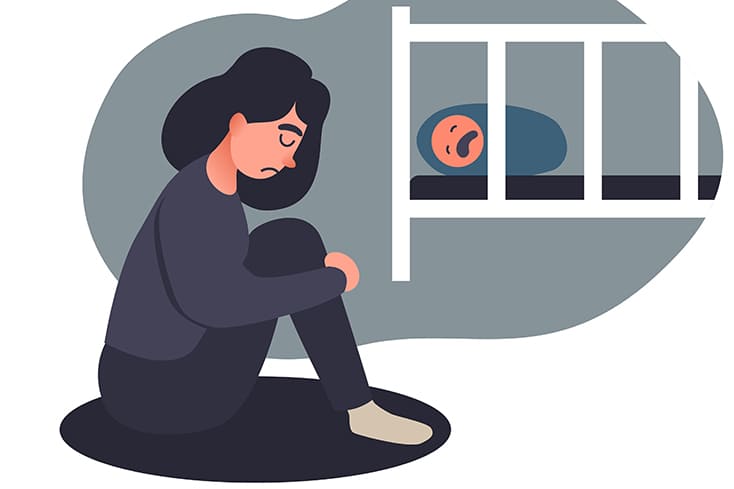November 13, 2020
By Moya L. Alfonso, PhD, MSPH

Motherhood, at its core, can be simply terrifying and exhausting. This is especially true for those with mental illness that stems from adverse childhood experiences.
Mothers who hold a newborn in their arms, and love it fiercely, but come from childhoods of severe abuse, are often the most terrified. The fear, simply put, is, "What if I hurt my own child like I was hurt?" Unfortunately, that fear, on average, is not heard by anyone who could help that young mother stop the cycle of childhood abuse that tends to underlie mental illness and addiction.
Facing the Hard Days of Early Motherhood
As a young mother, my traumatized brain brought postpartum psychosis. I was a terrified, not yet diagnosed, 19-year-old mother who loved my newborn with every breath in my body. Yet, while lying in bed next to my child’s cradle, I had thoughts of harming her. I was alone in my room with nobody but that helpless child. By the grace of God, I was able to pick her up, hold her far away from me, walk her across the hall to my parents and say, “please take her.”
Then, there was severe bipolar depression after the birth of my second daughter. I felt I loved her like no mother has ever loved her child, but I could not hold her after her birth. Night after night, my husband delivered our baby to me with no criticism of me as I lay in our bed feeling depressed and out of control.
I remember nursing her, staring at that amazing heart-shaped little face and wondering why I could not be the mother she so deserved. She does not realize it, but her father probably saved her life. He saved my life and continues to every day almost 30 years later.
Passing Down Mental Illness, Addiction and Trauma
Because of the cycle of early motherhood, adverse childhood experiences and resulting mental illness and addiction, I now have two daughters who struggle with mental illness and/or substance use disorders. Between our two daughters, my husband and I have six grandchildren and one on the way, but I live with the daily sadness of missing one of our grandsons who I am unable to see as my daughter battles her own addiction.
My trauma is intergenerational, passed down by my family line, crashing into me like waves in the sea. The waves are hard to escape even when you’re a grown adult and fighting with everything in you to make it finally stop.
Becoming the Nana my grandchildren need has been one of the hardest things I've ever done in my life. It meant facing some hard truths about myself. Truths that my own that my own parents aren’t ready to face about themselves.
I have chosen the arduous path of unlearning generations of harm passed down through my family tree. It’s a rocky, hard path to travel, but I am not alone as I trudge along thanks to my 12-step recovery.
Providing a Safe Space for My Family
Through years of hard work and support from others who have figured out how to face motherhood sober, I am now a Nana whose grandchildren can't stop telling me how nice I am, how cool I am, leaving pictures for me on my desk as a surprise, and following behind me in delight as I share with them stories of my grandmothers. The giggles I hear from shared moments of pure love and joy take my breath away.
In those moments of breathlessness, I call on the faith I have cultivated through my 12-step recovery. In reaction to my own childhood, I fight to stay present, to share our grandchildren’s and our daughter’s joy and pain. Every day, I work to be their safe place when the storms of life hit them.
There are many of us who have figured out how to face the ghosts of our childhood that we live with as adults and manage to thrive despite the haunting. I encourage you to find the strength and courage to share those terrifying thoughts and feelings you’re afraid to say out loud with another person who loves you and won’t judge you for what was done to you.
Fight to figure out how to mother your children without the blur of substances clouding your view — but also don’t be afraid to share your battle with others. Trust this 48-year-old, sober, happy Nana whose now strong enough to stare at the harsh light of motherhood without shades.
Moya L. Alfonso, PhD, MSPH is a 20-year veteran of public health, a consultant, and a trauma recovery blogger (www.drmoyaalfonso.com). She is a mother of two daughters and Nana to seven grandchildren. She lives in Tampa, Florida with her husband of 30 years and their fur babies.
Submit To The NAMI Blog
We’re always accepting submissions to the NAMI Blog! We feature the latest research, stories of recovery, ways to end stigma and strategies for living well with mental illness. Most importantly: We feature your voices.
LEARN MORE